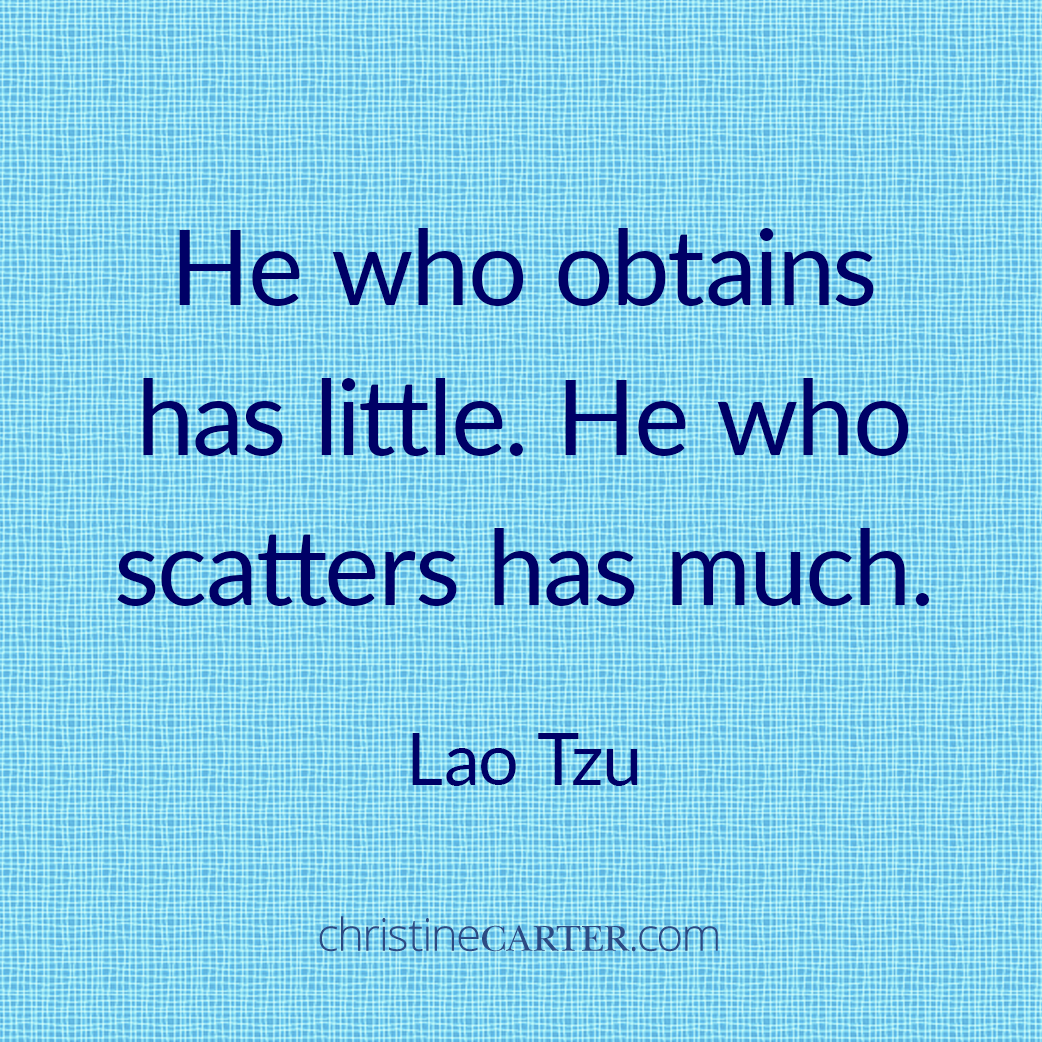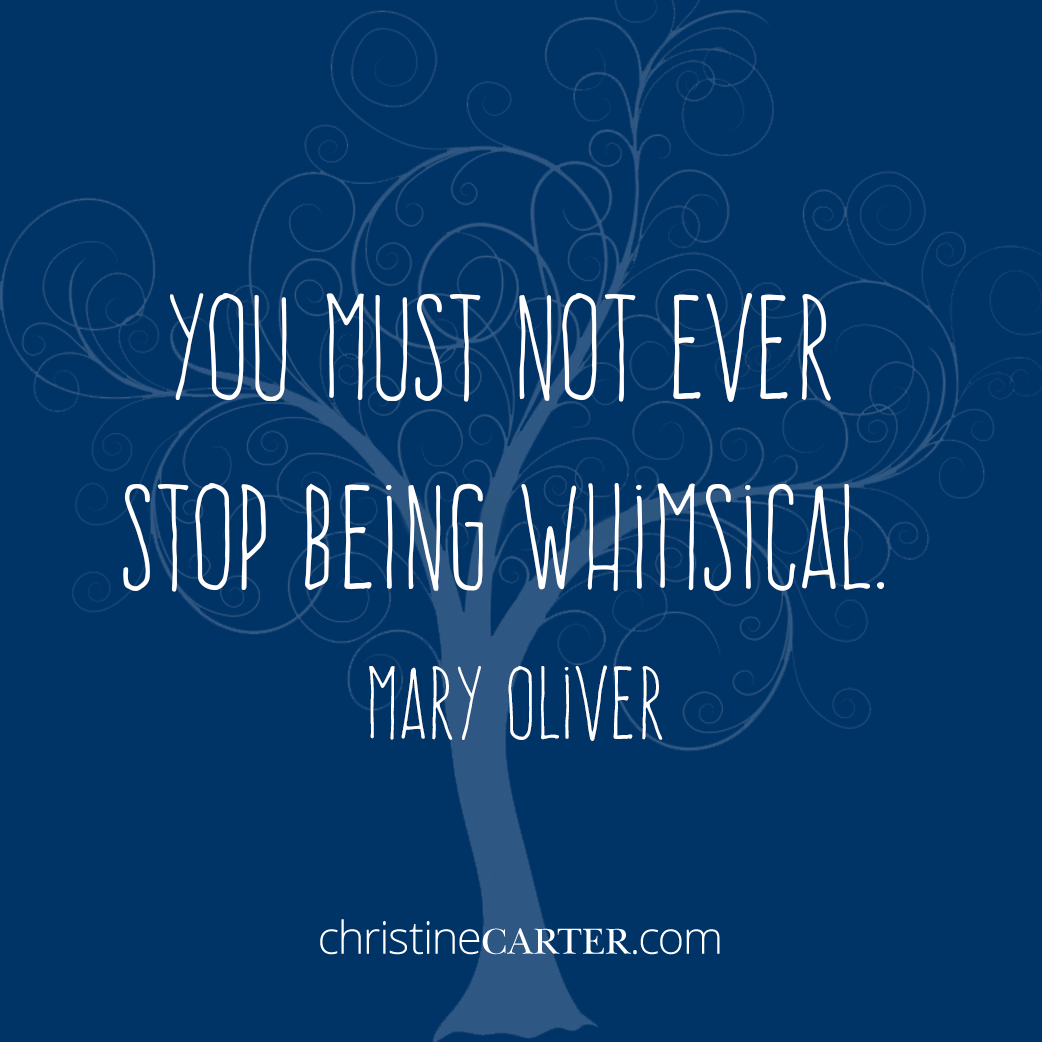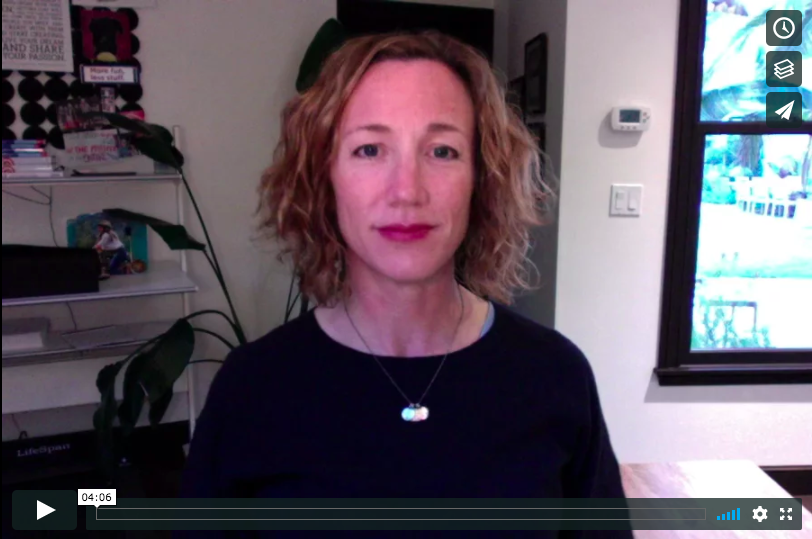He who obtains has little. He who scatters has much. —Lao Tzu


He who obtains has little. He who scatters has much. —Lao Tzu

You must not ever stop being whimsical.
—Mary Oliver

Many people love the idea of the holidays more than their actual experience of them — mostly because their list of holiday-related tasks and obligations outweighs the joy of it all. So that I can actually enjoy the holidays, I’ve devised this three-part plan.

My paternal grandmother died young, at age 49; within a year of her death, my grandfather had remarried the woman who would become my grandma. Even though her kisses smelled like cigarette smoke, I adored her. As a little girl, I did not know that she didn’t get along well with her adult stepchildren, my father and uncle.
My parents were very conscious about how they managed conflict in our family, and I learned a lot from that. I do remember some rather tense family gatherings; my parents didn’t hide their conflict with my grandma as much as they encouraged good behavior around her.
Is there someone in your family who stirs conflict? Below are five tactics for dealing with difficult people. You can teach them to your children, and model them yourself.
1. Keep calm like a champion. When you feel yourself starting to get irritated by someone, slow and deepen your breathing significantly. Taking several long, slow exhales can measurably lower your heart rate and blood pressure.
If you can, duck out of the situation so you can be alone for a moment. You may even consider making a “sh sh sh sshhhh” sound as you exhale, as though you are soothing a baby. This triggers the same muscles that you’d use when laughing; UCLA’s Marc Schoen has shown this to be extremely effective at keeping us calm, even when we are uncomfortable. The idea is to prevent our fight-or-flight response, which can make us aggressive and can make it very hard for us to be skillful in a challenging situation.
2. Accept the difficult person fully. This is a strangely effective strategy. When we accept a person we find challenging, we let go of the resistance that creates stress and tension. There’s a lot of truth to the adage, “What we resist, persists.”
Look at the person in question with kindness and compassion. Say to yourself, for example, “I see you, and I see that you are angry and insecure. I accept that you are anxious and scared, even if I don’t understand why. I accept that you are making all of us anxious, too. I accept that your trouble has become my trouble for the time being.”
Practicing this sort of acceptance is about dropping the fantasy of how we think things ought to be. You might have a fantasy of a sweet, close relationship with an in-law, for instance, and so you feel angry and disappointed every time he or she doesn’t live up to this ideal. But be aware that your in-law no doubt feels your disappointment, and feels judged. It might seem to that person like you’re trying to “fix” him or her, and it’s hurtful. This isn’t a good way for you to improve that relationship.
3. Let the other person be “right.” This is excellent practice for, well, enlightenment. It’s so hard, and our ego hates this practice more than anything. But when we let go of our need to be right, we deepen our acceptance of a situation and we engender peace despite differences.
Rather than simply listening to a family member so that you’re able to counter what that person says, try to listen for the sake of understanding. Where is he or she is coming from? This doesn’t mean you need to agree, just that you’re showing that person a basic level of respect. Research suggests engaging with a person this way – acknowledging the other’s point of view without judging it – can make that person feel more understood. As a result, he or she may be less defensive or difficult. Rather than interrupting with counter-arguments, try to paraphrase back the points you think a person is making, and acknowledge the emotions he or she seem to be expressing.
4. Give yourself permission to take care of your own needs first. This is a critical skill that many people – women especially – tend to feel guilty about. If this is you, repeat after me: “It is not selfish to take care of myself.” If you become weak or volatile from lack of self-care, you are all but useless to others.
For starters, get enough rest. It’s harder to regulate your emotions when you’re tired. In addition, don’t skip meals. Research shows that keeping your blood sugar stable will make you less aggressive if you get angry. And always remember to take a moment to leave the room, if possible, and breathe deeply if you find yourself in a particularly difficult situation.
5. Don’t take the bait. Sometimes it seems like a difficult person’s job is to provoke and incite. Family members know you and know how to push your buttons. Instead of engaging, see jabs and barbs as a cry for attention and connection. For a lot of people, conflict is born from an unfulfilled desire to feel useful and to be a part of something larger than themselves.
Start by giving the difficult person a way to focus on something besides himself or herself to feel connected and useful. If you’re having a meal with a difficult family member, you might ask that person to help your kids set the table. When you ask someone for help, provide a rationale for why that person might do you the favor. One decades-old study that’s still relevant today found that the word “because” tends to trigger compliance. For instance, you might whisper to your mother-in-law, “It would be great if you could show the kids how to set the table, because they need a little guidance today.”
We are all just looking for love, connection and friendship. One of the most wonderful lessons we can teach our children is that the greatest gift we can give ourselves is to accept a difficult person fully, and with love.

The greatest thing you’ll ever learn is just to love and be loved in return.
—Eden Ahbez

People seem to be taking issue with my claim that happiness comes when we live with total integrity—when we stop people-pleasing and start living more authentically.
I understand entirely why a lot of people fear the sort of transparency and honesty I’m advocating. We are clannish beings, with nervous systems that evolved to profoundly fear being rejected by our tribe. Acceptance can feel like everything, and for some people, it can be a matter of survival.
At the same time, for most of us, it is far better in the long run to be ourselves and risk having people not like us than to suffer the stress and tension that comes from pretending to be someone we’re not.
Does this mean, though, that we always say what we’re thinking? Sometimes it’s simply not safe, or smart, to do that. As one commenter recently mused:
Is there anyone reading this who has not had an interaction with a law enforcement officer for at least a minor traffic issue? a tail light out? a parking ticket? And during such an interaction, is telling that officer that you resent being stopped because you believe s/he hasn’t met their quota of fines for the month a wise idea? Or if taking a ticket to court, is it wise to tell the judge you think s/he is a fool? You might think that—but saying so may lead to needing a good attorney.
Granted, a traffic stop is a racial flashpoint and a huge public issue. For some people, a run-in like this one could be lethal, especially if they were to express hostility—however authentic that might be. But there is an enormous difference between living your truth and always saying what’s on your mind. I don’t think that it’s necessary, or even a good idea, in instances like this one to “speak your truth.”
Nor do you need to pretend to be happy about the situation. Being pulled over can be extremely stressful (even life-threatening) and pretending that it isn’t will simply ratchet up your fear response, which is not a good thing. Inauthenticity—in this case, actively pretending to be happy when you’re terrified—tends to increase the fight-or-flight response in both people, and in that way could actually make a scary situation more dangerous.
But it’s entirely possible to internally acknowledge your feelings, while remaining quiet or emotionally unexpressive to those around you.
This is where it gets tricky again. Say you are feeling afraid; is it best to indulge your fear? Even if you don’t tell the officer how frightened you are—or even if you don’t pretend to be happy about the situation—how does one behave authentically in this situation? If you are resentful, is it best to be transparent about your resentment? Should resentment dictate your behavior?
Often this is the way it works: Something happens—or we have a thought or memory—that triggers an emotion. In turn, that emotion triggers behavior.
Sometimes, the behavior is repression—the act of pretending that we aren’t feeling what we actually are feeling. Or an emotion triggers a numbing behavior, so that we don’t really feel something, as when we start to feel bored or anxious and we immediately check our phones. (This doesn’t work, by the way; physiologically our emotions get bigger when we stuff them down. But let’s leave that for another post.)
Emotions trigger loads of behaviors. They may cause us to hug someone we love, or lash out when we feel angry.
So again: If we are trying to live with total integrity, if we are attempting to “live our truth,” does that mean always acting on our feelings?
Again, I don’t think so. Why? Because often it simply isn’t effective. It won’t necessarily make us feel less stressed or more honest. In the same way that we don’t always need to say out loud everything that is on our mind, we don’t need to act on our every emotional impulse. We need to be aware of what we’re feeling, for sure, but we don’t always need to act in the ways that our emotions would dictate.
It can be even more effective to “act as-if” we are already feeling something else. Before you write me off as contradicting myself entirely, hear me out.
Just as emotions tend to trigger behaviors, behavior can also trigger emotion. Think about the wise (and almost cliched) advice to “take some deep breaths” when you are feeling stressed. A particular behavior can help to create a different emotional state than you may be feeling initially. We often think of this as the “fake it ‘til you make it” path to happiness.
There is a catch here, which gets confusing. “Faking it” only works when we aren’t pretending or performing. Consciously faking a smile, for example, to cover negative emotions (what researchers call “surface acting”) tends to increase our distress. This kind of toxic inauthenticity is corrosive to our health (especially our cardiovascular system), and it damages our relationships with others. It also makes it hard for us to access our intuitive or visceral intelligence.
Suppressing or numbing our emotions doesn’t work the way we often want it to. UNLESS—and here is the trick—we consciously foster the emotions that we want to feel in our lives. This is what researchers call “deep acting.”
Deep acting is when we genuinely work to foster specific feelings. When we make an effort to cultivate real happiness, gratitude, hope, and other positive emotions in our lives, we can dramatically increase our well-being—authentically.
Deep acting is what this commenter is asking about:
I’m wondering…if you would suggest that the idea of “acting as-if” for treatment would never work? I suggest the use of breathing, self-imagery, posture…to feel better and improve relationships.
When we are talking about the types of research-tested behaviors this commenter suggests, “acting as-if” can be quite different than pretending to feel something that we don’t.
Here’s the difference: Pretending is about hiding or denying our emotions, while “deep acting,” or “acting as-if” is about proactively fostering emotions, starting with an action or behavior.
It’s a fine line, to be sure. We sometimes become pretty invested in our false selves, in the “representative,” as Glennon Doyle Melton calls it, that we send out into the world instead of showing up fully and authentically as ourselves. We create representatives to protect ourselves, often in response to unstable or abusive situations.
Sometimes, we aren’t yet able to separate our false selves from our real ones. We want to defend the important representative that has worked so hard for us for so long. And that’s okay…so long as we can see where our representative is holding us back, and that it is, of course, the truth that will eventually set us free.
It’s only $20 to join our live coaching calls, thriving online community, and online resources. We’ll talk about how we often need to muster considerable courage to lead our most authentic lives—and work together on just how to do that. Learn more or enroll now.

The world is before you, and you need not take it or leave it as it was when you came in.
—James Arthur Baldwin

What if you didn’t have to worry about what other people think of you? Does your body sigh with relief at the thought of all the freed up time and energy you’d have? Or do you seize up with fear or resistance to the idea?
Authenticity’s appeal is obvious, but how does a person even go about being fully authentic, anyway? Here are 3 tips to get started.
Being authentic is, of course, at it’s core about being in total integrity with what is true for us. But most of us were not raised to be truth tellers, really–we were raised to people please. We were taught that white lies are totally okay. We were taught to pretend and perform and make nice.
But pretending–even if it is relatively meaningless, even if it is meant to protect someone else–is a form of lying.
And lying, even if we do it a lot, or are good at it, is very stressful to our brains and our body. The polygraph test depends on this: “Lie Detectors” don’t actually detect lies, but rather they detect the subconscious stress and fear that lying causes. These tests sense changes in our skin electricity, pulse rate, vocal pitch and breathing that the stress of lying causes. It’s as if all sorts of alerts go off when we lie, as if the body is howling for us to stop.
Fortunately, we become happier and healthier when we live our truth. It is also the only way to be authentic.
Sometimes it feels really hard to know who we are and what we want. But fortunately, our body always already knows what we are feeling, even when we aren’t conscious of it.
Try listening to the feedback that your body is giving you right now. Say something really untrue out loud, preferably to someone else. Try something like “I love it when my boss humiliates me in front of my team,” or “I adore having the stomach flu.” Then notice: How does your body react? The response will likely be ever so slight: a minuscule pulling back; or tensing of your jaw; or a tiny shoulder raise. When I say something that my unconscious mind hates, my body tries to tell me through a little heaviness in my stomach. If I spend too long doing something that feels wrong for me, I end up with a stomachache.
Now try saying something out loud that is true for you, and notice your body’s reaction. Try something like “I love the ocean,” or “I love the feel of my baby’s head on my cheek.” How does your body respond? When I say something that is very true for me, or when someone else says it to me, I get “chills of truth”—the hair literally stands up on my arms. And if I’m grappling with something hard, but the right answer comes up for me, I get “tears of truth.” Tears that tell me that something is profoundly true feel qualitatively different than the tears that come from grief or hurt.
What is true for us tends to make us feel stronger and more free. And lies tend to feel like constraint and constriction–our shoulders ache, our back hurts, or our stomach churns.
“Being You” is massively different from being perfect, or being the best possible version of yourself. We are all human, and by definition that means that we are often messy and raw and wrong.
When we love only the parts of ourselves that we deem to be good or strong or smart, we reject the parts of ourselves that make us real. This sets us up for inauthenticity. We start hiding what is real and showing off what is sparkly, but our seeming perfection is fake.
The only thing to do with all our imperfections is to accept them with forgiveness and compassion. And also to accept how we feel about our flaws, which is probably not so good. This does not mean that we are resigned to never growing or overcoming our weaknesses. It just means that we can be our true selves on this path. As Leonard Cohen sings in “Anthem:”
Ring the bells that still can ring.
Forget your perfect offering.
There is a crack, a crack, in everything.
That’s how the light gets in.
Loving and accepting ourselves–and all our flaws, including our anger and fear and sadness and our pettiness–is, in the end, the only thing that enables us to be authentic. It is also the greatest gift that we can give ourselves. It is the reason that authenticity makes us happier and healthier and more connected to those around us.
It’s only $20 to join our live coaching calls, thriving online community, and online resources. Upcoming call topics include:
We’ll talk about how we often need to muster considerable courage to lead our most authentic lives—and work together on just how to do that. Learn more or enroll now.

The art of being wise is knowing what to overlook. —William James

In the summer of 2016, when I received some horrible news about my health, I sent my family camping and sat on my bed for two days, spinning in thoughts of despair and sorrow. “I’m going to die and never see my children grow up. I’ll never write a book. We’ll go broke.”
After 48 hours of fighting like Muhammad Ali against my diagnosis, I did something radical. I asked, “What if I accept my situation? What would that feel like?” It felt TERRIBLE at first. My thoughts rushed in to yell at me, “You’re going to give up? You’re so weak!”
So I tried something new. I meditated on each of my thoughts and realized that what was causing me suffering was not the tumor that I could not feel in my body. Instead, my thoughts about the tumor were killing me, even before I spoke to a specialist. I needed to stop blindly believing everything I was thinking. I was going to have enough real physical pain to deal with; I didn’t need to make it worse with my thinking!
Then, something strange happened: I noticed that there was no difference between the thought “I’m going to die young,” and “I’m going to come out of this better than before” except for the way those thoughts made me feel. The relief I felt when I recognized this truth was enormous. I felt big, light, and free. I even laughed.
The minute I laughed at my most desperate thoughts, they lost their hold on me and seemed to disappear. It was as if they knew the gig was up, and moved on to someone else: “C’mon guys, let’s go bug another middle-aged woman who believes us.” Accepting my situation, while questioning my thoughts before letting them go, was making enough space in my head for wisdom.
Wisdom said, “No matter how bad your diagnosis, you still have a choice. You can spin and believe the stories that fill you with panic and despair. Or you can choose to see them not as reality, but just as stories.” I wrote down eight words in my journal: I choose joy over fear, brave over perfect.
What does it mean to be “brave over perfect”? To me it means radically accepting myself and things as they are, and moving forward anyway. I am discovering that the world is far friendlier without my scary thoughts driving the bus. I procrastinate less and take more risks. I don’t need to please others as much anymore. I write and post my work publicly. I’ve gone from believing that my writing is not worthy of an audience to feeling, Oh well. It is good enough.
I, too, feel good enough for the world. I say no without guilt. For example, I just said no to a party that we go to every year. I called my friend to tell her honestly, “I love your family. I’m sorry I won’t be there. Sunday is my best writing day.” My friend laughed and surprised me by saying, “Good for you. Let’s go for a walk later instead.”
The best news? I feel freer and happier now than I did before my diagnosis.
* * * * *
I wake up at 3am as the wind roars outside, rattling windows, pelting the house with pine needles and seed pods from the trees. I feel panic; hot, dry winds like these started the recent Northern California wildfires. Have we prepared enough for an emergency evacuation?
Less than a week into the horrific wildfires near our home, I had to leave town for work. The fires raged only a few miles away. Evacuees and their pets filled our house. People we knew were losing their homes left and right.
To make myself feel better, I typed up three pages of detailed instructions for what my family should do in case of fire or earthquake. Everyone in my family knew that the unspoken title of this little manual was “Memorize This in Case Mom’s Not Here to Tell You Precisely What to Do in an Emergency.”
I further tried to soothe my anxiety about leaving home in the middle of a natural disaster by making my family practice an emergency evacuation. Tanner volunteered to take care of the family heirlooms. I drilled him, dead serious: “Which are the high priority photo albums?” Macie, who shares my ever-present desire to control everything, asked clarifying questions about our family meeting place.
Molly was drawing on her ankle with a ballpoint pen. “Molly! Pay attention! When you get Buster into the car, what else do you need to make sure you have with you?”
My husband rolled his eyes.
Now, two weeks later, I am lying in bed in the middle of the night, again away from home. This time I am with my family in hot and dusty Ojai, California. The dry winds howl against the house. I know fire is an always-present danger. I try not to imagine the hills around us bursting into flames.
And then I slowly realize: Oh. My. God. No one is home to execute my detailed evacuation plan in case of fire. We would be safe, but like so many families we know, we would lose absolutely everything, the carefully crafted (and now laminated) emergency plan included.
Until recently, I’d thought that I’d more or less conquered perfectionism. Perfectionism, I’d become fond of saying, is a particular form of unhappiness. Thank GOD I’m not a perfectionist anymore.
Hah.
While it is true that I am no longer as afraid of making a mistake or disappointing others as I was in my youth, I have obviously not yet rid my life of perfectionism. I’ve just turned it outward, to the world, and especially to others.
Every time I try to control anything other than my own thoughts–the weather, my husband, my children–I’m sending a message to the world and the people around me that they are not good enough. This absolutely is perfectionism, and indeed, it is a particular form of unhappiness.
No matter how hard I try, I cannot control what is happening outside of my own head. This makes the world we live in tremendously uncertain. And because I am human, uncertainty makes me anxious.
Although I often forget it, I know that soothing my anxiety by trying to control everything and everyone doesn’t ever work in the end. The only thing that does work is acceptance: to accept that life (or a particular circumstance) is tremendously uncertain. Or maybe not what I wanted. And also to accept my feelings about any given situation.
For example, I accept that there are wildfires raging, and also that I feel sad and anxious about the destruction that is all around me. Acceptance is not the same as resignation, and it’s definitely not despair. It’s okay to prepare for the worst while hoping for the best.
Most importantly, acceptance is about simply trusting that it’s going to work out better to meet life where it is, and move forward from there, without trying to manipulate or control everything and everyone.
This not-controlling business? It is not for the faint of heart. Acceptance takes a huge amount of courage.
Neither Susie nor I have fully recovered from perfectionism. Perfectionism is a little like an addiction, and recovery from it is a little like sobriety. We take it one day at a time.
What Brave over Perfect means to us today is this: We choose to accept uncertainty and take action from a place of trust. Saying yes to life and all of its unknowns now feels relaxing and expansive. It’s like finally having a great night’s sleep and waking up with wings.
* * * * *
Our Brave Over Perfect coaching group is a highly effective and extremely inexpensive alternative to life coaching and, for some people, therapy. If you’re interested in personal growth, this is less a lot less work than reading a book (and at only $20 for three calls, it’s totally affordable).